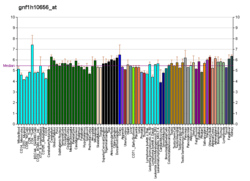OR2T6
Olfactory receptor 2T6 is a protein that in humans is encoded by the OR2T6 gene.[4]
| OR2T6 | |||||||||||||||||||||||||
|---|---|---|---|---|---|---|---|---|---|---|---|---|---|---|---|---|---|---|---|---|---|---|---|---|---|
| Identifiers | |||||||||||||||||||||||||
| Aliases | OR2T6, OR2T6P, OR2T9, OST703, olfactory receptor family 2 subfamily T member 6 | ||||||||||||||||||||||||
| External IDs | MGI: 3030554 HomoloGene: 74036 GeneCards: OR2T6 | ||||||||||||||||||||||||
| |||||||||||||||||||||||||
| |||||||||||||||||||||||||
| |||||||||||||||||||||||||
| Orthologs | |||||||||||||||||||||||||
| Species | Human | Mouse | |||||||||||||||||||||||
| Entrez | |||||||||||||||||||||||||
| Ensembl |
| ||||||||||||||||||||||||
| UniProt | |||||||||||||||||||||||||
| RefSeq (mRNA) | |||||||||||||||||||||||||
| RefSeq (protein) | |||||||||||||||||||||||||
| Location (UCSC) | Chr 1: 248.38 – 248.39 Mb | n/a | |||||||||||||||||||||||
| PubMed search | [2] | [3] | |||||||||||||||||||||||
| Wikidata | |||||||||||||||||||||||||
| |||||||||||||||||||||||||
Olfactory receptors interact with odorant molecules in the nose, to initiate a neuronal response that triggers the perception of a smell. The olfactory receptor proteins are members of a large family of G-protein-coupled receptors (GPCR) arising from single coding-exon genes. Olfactory receptors share a 7-transmembrane domain structure with many neurotransmitter and hormone receptors and are responsible for the recognition and G protein-mediated transduction of odorant signals. The olfactory receptor gene family is the largest in the genome. The nomenclature assigned to the olfactory receptor genes and proteins for this organism is independent of other organisms.[4]
See also
References
- ENSG00000278689, ENSG00000278659 GRCh38: Ensembl release 89: ENSG00000198104, ENSG00000278689, ENSG00000278659 - Ensembl, May 2017
- "Human PubMed Reference:". National Center for Biotechnology Information, U.S. National Library of Medicine.
- "Mouse PubMed Reference:". National Center for Biotechnology Information, U.S. National Library of Medicine.
- "Entrez Gene: OR2T6 olfactory receptor, family 2, subfamily T, member 6".
Further reading
- Fuchs T, Malecova B, Linhart C, et al. (2003). "DEFOG: a practical scheme for deciphering families of genes". Genomics. 80 (3): 295–302. doi:10.1006/geno.2002.6830. PMID 12213199.
External links
- OR2T6+protein,+human at the US National Library of Medicine Medical Subject Headings (MeSH)
This article incorporates text from the United States National Library of Medicine, which is in the public domain.


